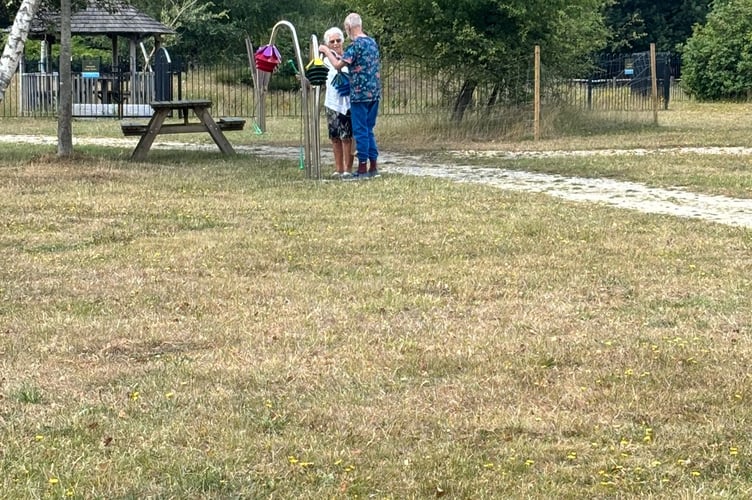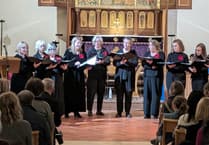Nestled in 30 acres of Surrey countryside, something remarkable is happening at The Huntington & Langham Estate care home. A pilot project – believed to be the first of its kind – is bringing together nature, music, and dementia care in a way that is already reshaping how we think about connection in later life.
The project, called Sounding Out, is exploring how outdoor instruments can support people living with dementia. The study, a collaboration between Percussion Play and The Huntington & Langham Estate, is being led by Stuart Wood MBE – a musician, academic and Visiting Research Fellow at Bath Spa University.
Stuart has taken on a new role as ‘Musician-in-Residence’ across two care homes on the estate – Langham Court and Huntington House – to investigate how music and nature can come together and make a difference to those in care.
“This is the first time outdoor instruments have been introduced into a care setting as part of a serious research project,” said Stuart. “We know music helps. We know nature helps. But what happens when the two come together?”
The project places outdoor percussion pieces – designed by UK-based firm Percussion Play – into everyday life at the care home. They are tuned to pentatonic scales, meaning that no matter how they are played, or the player’s musical experience, the sound is harmonious. This makes them accessible to everyone, regardless of ability – and crucially, inviting.
“They call to the eye,” Stuart explains. “They invite touch. And each time someone plays them, something unique happens. It becomes an event. An interaction. A point of connection.”
What began as an experiment is quickly becoming a cornerstone of care at Langham Court, which follows the award-winning Butterfly Model – an emotions-based approach that seeks to ‘catch’ fleeting moments of joy and meaning.
Claire Parker, Care Coordinator, explains: “With dementia, moments are precious. We use what we call the ‘butterfly method’ to turn small, spontaneous experiences into real events. These instruments help us catch more of those moments. They’ve been magical.”
Claire has observed powerful emotional responses in residents who often struggle with language. “The music strips away the need for complicated conversation. For many people living with dementia, speech can be a barrier. But with the instruments, music becomes a direct line. A form of communication in its own right.”
Lucie Thornton, Marketing, PR & Community Engagement for Huntington & Langham Estate, agrees. “What’s so beautiful is that music brings everyone to the same level. Residents, family members, carers – we’re all experiencing the same thing together. That’s where authenticity happens. That’s when real connection forms.”
Within days of the instruments’ installation, Lucie witnessed residents who rarely spoke begin to hum, tap rhythms, and smile. One resident danced. Another began singing fragments of a childhood song. Staff noticed the instruments were being used independently, without prompting.
“That told us something important,” Stuart said. “There’s a longevity here. They’re not a novelty – they’re becoming part of the environment.”
The early data backs this up. In feedback collected from families and staff, 100 per cent said the instruments made them more likely to spend time outside. Every respondent also said the instruments improved the quality of family visits – giving relatives and residents something to do together, beyond the limitations of traditional care home activities.
“It’s not just about music – it’s about shared purpose,” Stuart said. “These instruments have turned a quiet corner of the garden into a space of interaction and joy. They have become an event.”
And crucially, it is not only residents living with dementia who have responded. “Some of our residents who are cognitively well have had deep, even spiritual, connections through making music outdoors,” Lucie said. “That combination of nature and creativity seems to unlock something.”
The project is part of Stuart Wood’s wider research into music and care, and builds on his longstanding work exploring how musical engagement can improve health and wellbeing. He describes the Sounding Out pilot as “a new chapter” – a way to bring together academic research, musical craftsmanship, and frontline care.
“The idea isn’t just to parachute in a musician and leave again,” he explains. “I’ve spent time getting to know the residents, training staff, and embedding music into daily life. We want this to become sustainable.”
That ethos is already taking hold. Claire has plans to integrate musical moments into Langham Court’s new ‘meaningful moments’ framework, which pairs carers with residents for one-to-one personalised time.
“Music is something almost every resident responds to, and many of them were musicians themselves,” Claire said. “Stuart gave us tools – not just how to use the instruments, but how to approach music as a way of connecting. This wasn’t just a weekend of fun. It’s something we can build into how we care, every day.”
One resident called the instruments “therapeutic” while another said: “I have enjoyed playing the instruments this week and have enjoyed playing the ones outside with my family who thought they were great.”

The Huntington & Langham Estate is no stranger to innovation. The family-run organisation has been delivering high-quality, person-centred care for more than 40 years and was recently recognised at the National Dementia Awards for excellence in its field. Director Sarah Chapman says the decision to partner with Percussion Play came from a shared belief in the transformative power of music and nature.
“We are very excited to be piloting this project alongside Percussion Play. We are curious about the possibilities and the benefits of combining music and nature and the impact this might have on the wellbeing of our residents and their families,” she said.
Her brother, Managing Director Charlie Hoare, agrees. “We are really keen to see whether the project can help answer some poignant, largely unanswered questions about how best to encourage meaningful engagement and interaction within care homes and what works best for building strong relationships and connections between people living and working together.”
For Percussion Play, the project represents a step forward in applying their instruments in a research-based context. CEO Jody Ashfield says he hopes the results will help reshape how care homes across the UK and beyond think about outdoor space.
“Our instruments are already used in parks, schools and hospitals,” said Jody. “But bringing them into dementia care as part of a structured, studied intervention is a major step. We’ve long known they bring joy – this helps us understand the deeper impact.”
Early signs from Sounding Out suggest the potential is vast. Plans are underway for a larger-scale study, and Stuart will be sharing his findings with students and researchers at Bath Spa University as part of his fellowship. Results from the pilot will be analysed later this year and are expected to inform future models of care internationally.
Stuart puts it simply: “It’s not about performance. It’s about presence. Music isn’t just something we listen to – it’s something we share. And in a place like this, sharing is everything.”




.jpg?width=209&height=140&crop=209:145,smart&quality=75)
Comments
This article has no comments yet. Be the first to leave a comment.